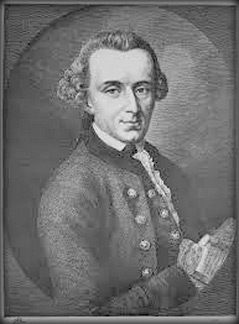Kant, the moralist and universalist
 We live in a time troubled by intense moral issues concerning child
abuse, rape, murder, looting, arson, theft, terrorism, drug abuse and
what not. In addition, bribery and corruption stare in our face at every
corner. A philosophically inclined person might wonder whether we are
coming close to the end times. Despite the great strides in science and
technology, most of us pay scant respect for morals. Does it mean that
we have lost respect for ourselves and others? We live in a time troubled by intense moral issues concerning child
abuse, rape, murder, looting, arson, theft, terrorism, drug abuse and
what not. In addition, bribery and corruption stare in our face at every
corner. A philosophically inclined person might wonder whether we are
coming close to the end times. Despite the great strides in science and
technology, most of us pay scant respect for morals. Does it mean that
we have lost respect for ourselves and others?
The word “moral” comes from the Latin moralis, meaning “custom,
manner or conduct.” There are moral, amoral and immoral people. Moral
conduct is what the average man considers good. In the same way immoral
people do what society considers bad. Drinking, prostitution and
adultery are considered immoral conduct. Then there are amoral or
nonmoral people who are not concerned with morals. They make no value
judgements.
For the majority of us moral dimension confronts us at home, office,
classroom or even in public places such as libraries, railway stations
and wherever people gather. On every such occasion we try to determine
who is at fault or responsible for a particular way of behaviour.
However, moral issues are really baffling. Do we have a moral right to
hang a murderer? Do parents and teachers have a moral right to punish
children? There can be many answers depending on how you look at them.
While lawyers, psychologists, philosophers and religious leaders are
trying to cleanse society of evil, they have not made much headway.
Causes
Today biopsychologists and geneticists have found that there are many
physical and biochemical causes of human behaviour which is beyond
anybody’s control. The million dollar question is whether we can leave
human life to be governed by the laws of chemistry and physics. If we do
so, no offender can be punished as he would say that he had no control
over his actions. Then how do we justify moral sanctions and punishment
for offenders? If a man has no moral choice, he is not different from
any other animal.
|

Immanuel Kant: Two things fill the mind
with ever new and increasing admiration
and awe... the starry heavens above and
the moral law within. |
Immanuel Kant’s (1724-1804) contribution to philosophy is
immeasurable. As far as morality is concerned he took a different stand
from his predecessors. With his rigorous religious background Kant
resented the heavy emphasis on a theology of terror and piety in later
life. However, he never lost his regard for righteousness and morality.
He followed a rigid schedule in his life. He is reported to have missed
his walk only once, when he was so absorbed in reading Rousseau’s Emile
that he forgot to take it.
Although Kant is a renowned moral philosopher, most of his books are
difficult to understand. When he sent his manuscript of the Critique of
Pure Reason to the metaphysician Marcus Herz, the latter sent it back to
him saying, “If I finish it, I am afraid I shall go mad.” On the other
hand, his books were full of Latin terms and German phrases. Some of his
writings disturbed rationalists, empiricists and theologians. Some
clergymen called him a dog and others called their dogs Kant! However,
Kant goes down history as a philosopher who altered Western thinking.
Scientific progress
At a time when scientific progress challenged the dominant
philosophies of the day, Kant did not abandon philosophy to fall in line
with science. He saw how science was unveiling a mechanistic world. In
such a world God has no place and people paid lip service to morality.
He defended moral laws by saying that man’s behaviour is more complex
than that of rocks and worms.
According to Kant, we use practical reason to move beyond the
phenomenal world to the moral dimension. Practical reason begins with
knowledge about moral conduct. It also helps us to deal with the moral
freedom. Kant uses the term practical reason to indicate that we do not
act on impulses and desires alone. We also act from conscious choice.
For Kant, morality is a function of reason, Moral rules of behaviour
differ from other pragmatic rules which are very often codified. We have
to consider moral rules having universal validity. On the other hand,
moral rules cannot be discovered in actual behaviour. For instance, a
barbarian might consider it is quite “moral” to consume the flesh of
another man, But man is a rational animal. The capacity for reason is
the source of morality. Reason imposes moral obligations.
Can man live in a world in which no one had any moral obligations?
Kant said, “No.” He said morality is a sine qua non for human
relationship. However, obeying God or nature out of fear or necessity is
not moral. Moral law is obligatory because it springs from our own
rational nature and becomes law only when we willingly assent to it. He
describes the moral universe as the “Kingdom of Ends” in which everyone
is an end in himself or herself. this leads to the inevitable conclusion
that we are means and ends. |

